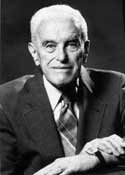![]()
![]()
Nobel Laureate John
Harsanyi dies at 80
![]()
|
|
|
Harsanyi was awarded the Nobel Prize for his work in game theory, a mathematical theory of human behavior in competitive situations that has become a dominant tool for analyzing real-life conflicts in business, management and international relations. He shared the award with Reinhard Selten and John Nash.
When Harsanyi, an immigrant from communist Hungary, won the Nobel Prize, he expressed hope that game theory would help public and private institutions make better decisions and, in the long run, lead to more peaceful and more cooperative political systems.
"Professor Harsanyi's life-long work probed the idea of rationality in human affairs, and he was a scholar who cared deeply about the human condition. We will miss him at Berkeley, where his years of devoted teaching and his ground-breaking research inspired us all," said Chancellor Berdahl.
Harsanyi began teaching at the Haas School in 1964 and remained on the faculty until his retirement in 1990. He accepted a joint appointment on the economics faculty in 1966.
"John Harsanyi dedicated his life to employ the science of economics and game theory for the betterment of the human race," said Haas School Dean Laura Tyson. "He was a brilliant thinker, a gracious man, and a gentle soul, ever concerned with the well-being of others.
"The passing of John Harsanyi is a great loss to the economics profession and to his many friends and colleagues on this campus," said John Quigley, professor of economics and former department chairman. "Harsanyi's work was instrumental in making economic theory 'fit' the imperfect world in which we live.… His seminal works form the basis for all modern analyses of industrial organization, and they have real practical implications in business and government policy. John was a gentle and shy man," Quigley said, "but a bold and powerful intellectual presence."
Harsanyi's principal contributions to the field of game theory addressed the prediction of outcomes in games or situations in which the players lack complete information about each other or the rules of the game.
Harsanyi was born in 1920, in Budapest, the son of a Catholic pharmacist of Jewish descent, and was educated at the University of Budapest. In 1944, the Germans occupied Hungary, and Harsanyi, was drafted into a forced-labor unit. Shortly thereafter, he narrowly escaped deportation to a mine or concentration camp by the Nazis, finding refuge at a Jesuit monastery.
After the war, Harsanyi earned a Ph.D. in philosophy at the University in Budapest A Stalinist regime seized power in Hungary in 1948; two years later, Harsanyi and his wife-to-be escaped across the border to Austria, and emigrated to Sydney, Australia, where Harsanyi worked in factories during the day while earning an M.A. in economics at night. In 1954, he entered Stanford University's Ph.D.program in economics, writing his dissertation on game theory under the guidance of the future Nobel Laureate Kenneth Arrow.
Harsanyi is survived by his wife, Anne, of Berkeley, and son, Tom, of Somerville, Mass.
A
memorial service for the campus community will be held at 4
p.m., Thursday, Aug. 31, in the Faculty Club Great Hall.
Donations in John Harsanyi's memory may be sent to the
Alzheimer's Association of the Greater Bay Area, 2065 West
El Camino Real, Mountain View, Calif., 94042.
![]()
![]()
[HOME] [SEARCH] [ARCHIVE] [ABOUT] [CONTACT] [MORE
NEWS]
![]()
Copyright 2000, The Regents of the University of
California.
Produced and maintained by the Office of Public Affairs at
UC
Berkeley.
![]()
Comments? E-mail berkeleyan@pa.urel.berkeley.edu.
